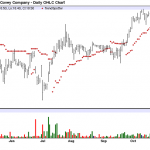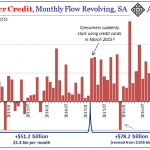With about 3/4 of the totals in, vehicle sales in June are running no better than even compared to May’s 16.7 million annualized rate according to Econoday.
The Wall Street Journal report is much weaker: U.S. Auto Sales Fall as Fewer Vehicles Go to Rental Chains.
According to the article subtitle, GM, Ford and Fiat Chrysler are moving away from practice of dumping unwanted inventory into rental lots. The body reads quite differently. It is the rental car dealers cutting back due to warranted fears of a decline in used vehicle prices.
Auto sales continued to slide in June, as car buyers react to higher vehicle prices and Detroit backs away from dumping unwanted inventory into rental-car lots.
General Motors Co. (GM), Ford Motor Co. (F) and Fiat Chrysler Automobiles (FCAU) reported steep monthly sales declines compared with the same period in 2016. While retail demand is losing steam, each of Detroit’s players also reported significant reductions in deliveries to daily-rental companies, long the Motor City’s biggest customers.
Even as auto makers ramp up incentive spending to improve dealer traffic, transaction prices are rising as cars are loaded with more safety gear and connectivity features. A consumer shift away from sedans and toward pricier sport-utility vehicles also aided the trend.
Edmunds.com reported that the average monthly payment on a car or truck has soared above $500, forcing buyers to stretch more than ever to obtain a new set of wheels. The firm estimates the average auto-loan length reached a record 69.3 months in June, with the average amount of financing reaching $30,945, up $631 from May.
GM’s sales fell 5% to 243,155 vehicles in June, while Ford’s sales totaled 227,979 vehicles, down 5.1%. Fiat Chrysler’s sales slumped 7% to 187,348 vehicles.
Japan’s top sellers fared better during the period.
Honda Motor Co. reported a 1% increase compared with the previous June with 139,793 vehicles sold, aided by gains at its Acura luxury division, while Nissan Motor Co. sold 143,328 vehicles, or 2% more than the prior year, as it ramps up its reliance on trucks. Toyota Motor Corp. notched a 2.1% gain, with 202,376 vehicles sold.
Certain Asian auto makers, including Korea’s Hyundai Motor, have fueled sales with rental-car sales. At Nissan, rental sales surged 37% in 2016 and were up 9% this year through May, making Nissan the only major auto maker to boost rental deliveries, according to data from Bobit Business Media, a publisher of trade magazines.
Enterprise, one of the leading car-rental firms, reduced its vehicle purchases in the first half of the year compared with 2016, said Kurt Kohler, a senior executive in charge of the rental company’s fleet acquisition. He said signs of declining used-vehicle prices heading into the year prompted Enterprise to narrow its shopping list.
“The market started to move on us, so we pulled back a bit,” Mr. Kohler said. “The car segment already had been declining, but we also saw pricing coming down on SUVs and trucks. That affected how much we wanted to buy.”












Leave A Comment